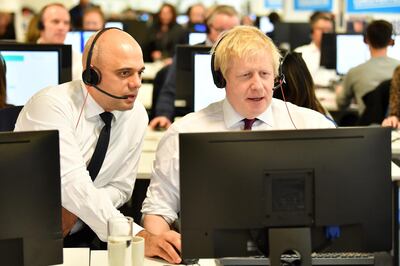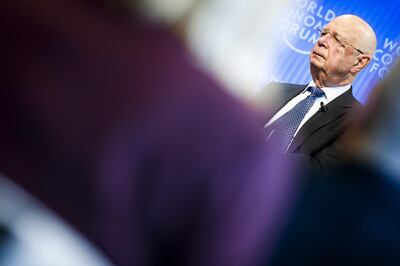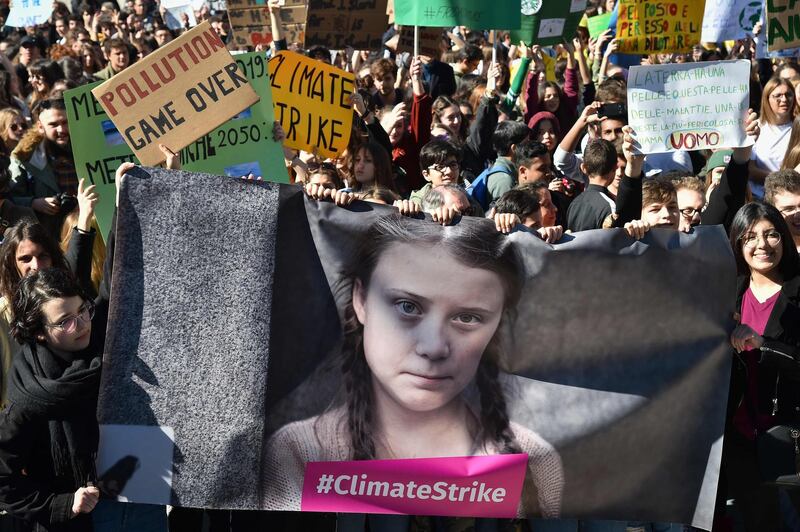A golden jubilee is usually a cause for celebration, a time for taking pride in past achievements over five decades. The mood music in advance of the annual meeting of the World Economic Forum, which will mark its 50th year when it opens next week in Davos, Switzerland, is, however, considerably less upbeat.
"Davos", as the event is known, usually attracts a smattering of world leaders. But it is so dominated by global corporate titans and billionaires that one website recently called it "the world's most luxurious business bash". For such a gathering to be addressed once again as it will be by Greta Thunberg, the 17-year-old climate activist, will be a singularly self-flagellating experience for attendees at the forum's half-century event. Many will have flown in by private jet. Ms Thunberg, who disapproves of large carbon footprints, will by contrast probably arrive by train to deliver what is sure to be a tongue-lashing.
She has already signalled that she will demand that “participants from all companies, banks, institutions and governments immediately halt all investments in fossil fuel exploration and extraction, immediately end all fossil fuel subsidies and immediately and completely divest from fossil fuels". Many see this ultimatum as impossible to enact, and others who are concerned deeply about the environment believe that such a radical outcome is just not practical, given all the disruption, not to say job losses, it would cause. In person, however, her presence is all the more likely to have representatives of big business and the cheerleaders for globalisation staring at their shoes, as their vague promises to do something wilt under the unforgiving purity of her relentlessly stern gaze.
As if that was not enough to deflate the festive atmosphere, Boris Johnson, the British prime minister, publicly announced in December that he was banning his ministers from attending this year’s Davos. A source said: "Our focus is on delivering for the people, not champagne with billionaires" – an unprecedented rebuke from a centre-right administration that would normally be expected to be an unequivocal champion of the private sector.

In the event, Mr Johnson has allowed Sajid Javid, the finance minister, to attend. But that hardly mitigates the slap in the face. The message was clear: Davos Man (and Woman) is now the “unacceptable face of capitalism”, to use a phrase first coined by one of Mr Johnson’s predecessors. Could the great and the good who serve on the forum’s committees and panels ever have expected to be so unpopular at so significant a milestone?
They might think it a little unfair. Have they not selected seven worthy themes for this year’s event – Fairer Economies; Better Business; Healthy Futures; Future of Work; Tech for Good; Beyond Geopolitics; and How to Save the Planet?
Perhaps. But there is clearly an awareness within the forum of its terrible reputation among activists – so much so that this year they invited Micah White, the co-creator of Occupy Wall Street movement of 2011, to attend, and have published an article by him on their website titled: “Why I'm going to Davos – and why I'm hoping my peers don't find out”.
“For me, attending Davos will most likely be reputational suicide: a sign that I have done something wrong, sold out or been compromised,” Mr White wrote, before concluding it was important that what he terms “uncivil society” claim its place as a stakeholder alongside government, business and civil society.
Professor Klaus Schwab, founder and executive chairman of the forum, acknowledged last year that dissatisfaction with globalisation and free-market economics – for which “Davos” has become a byword – is not limited to the radical left. “People are revolting against the economic ‘elites’ they believe have betrayed them,” he said, “and our efforts to keep global warming limited to 1.5°C are falling dangerously short.” Mr Schwab is trying to set an example: this year’s forum is expected to be fully carbon neutral.
Yet it will not be enough. Neither is it remotely likely that the government and business leaders will agree to Ms Thunberg’s insistence that they end the fossil fuel economy “now – as in right now”. The forum seems destined to disappoint not only Ms Thunberg, but also others suspicious that any gradualist suggestions that come out of the meeting will not be backed by the necessary action nor keep to whatever deadlines may be proposed.

Worse than that, the problem is that whatever solutions may have been aired in Davos in the past, and whatever success it may have had had in fulfilling its mission – "improving the state of the world" – the forum is irredeemably associated with a state of affairs in which 44 per cent of American workers "can barely make ends meet" and are "still struggling to get by", as the former US labour secretary Robert Reich recently tweeted. There is no shortage of examples of how market-driven economic policies have failed so many in other wealthy countries, such as the horrific rise of food banks in Britain – an obscenity in the world's fifth largest economy.
As Mr Reich wrote during last year’s forum: “The world’s richest 26 billionaires now own as much as the 3.8 billion who comprise the bottom half of the world’s population. If Davos’s attendees ignore all this they are deluding themselves.” He pointed to “a pervasive sense that elites are rigging the world economy for themselves. And guess what? They are".
To the wider world, those “elites” are exactly what Davos represents. It has come to be seen as a forum where plutocrats and technocrats insulated from the harsher consequences of dog-eat-dog capitalism agree to rub shoulders with – and take photos with – celebrity activists such as Bono and the Dalai Lama; then fly home and carry on exactly as before.
As a brand its self-congratulatory, out of touch back-slappery has become so toxic that one wonders if it can possibly be saved. A dose of the asceticism and self-denial Ms Thunberg advocates might be the only way it could regain credibility, rather than arouse hostility. Let them eat kale, not cake, drink recycled water instead of fine vintages, and most of all show some contrition for the catastrophes that unbridled capitalism has visited on so many.
For let there be no doubt: as he turns 50, there are very few people wishing “Davos Man” a happy birthday.
Sholto Byrnes is a commentator and consultant in Kuala Lumpur and a corresponding fellow of the Erasmus Forum






